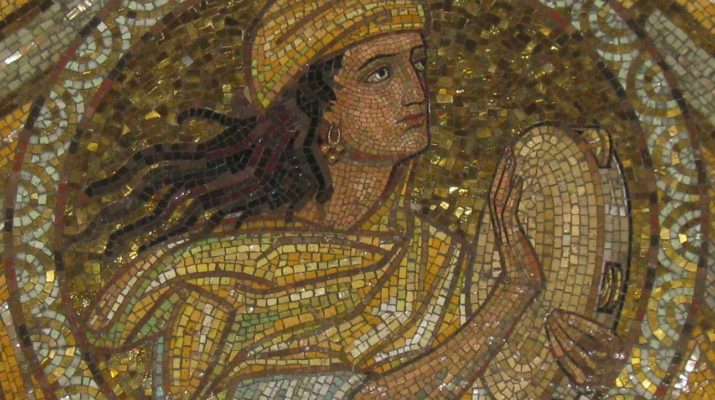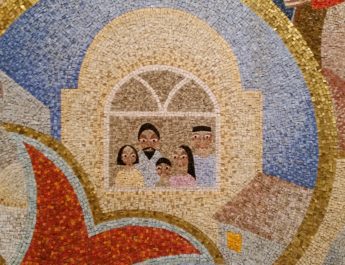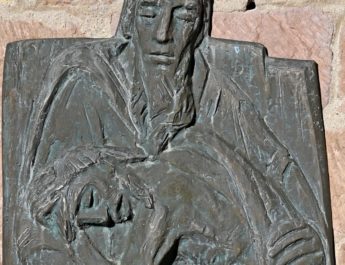Exodus 15:1b-11, 20-21
Ordinary A42
1 Then MosesA and the IsraelitesB sang this song to the Lord:C
A “Moses” = mosheh. From mashah (to pull out in a literal or figurative sense, to draw out) OR from Egyptian mes or mesu (child, son i.e. child of…). This is Moses – the one drawn out from the water, which is to say, rescued. If derived from the Egyptian, his name would share a root with Rameses and Thutmose.
B “Israelites” = ben + yisrael. Literally “children of Israel.” From sarah (to persist, exert oneself, contend, persevere, wrestle, prevail) + el (God or god). This is God strives or one who strives with God; new name for Jacob and for his offspring. This refers to the people and to the land.
C “Lord” = YHVH. From havah (to be, become) or hayah (to come to pass, become, be). This is the name of the God of Israel, the self-existent and eternal one, the tetragrammaton. This pronunciation has been lost to time so “Lord” is generally used in its place.
“I will sing to the Lord, for he has triumphed gloriously;D
horseE and riderF he has thrownG into the sea.H
D “triumphed gloriously” = gaah + gaah. 7x in OT. This is to rise up, be exalted, triumph. Figuratively, it is to be majestic. The word is repeated twice – the first time as an Infinitive Absolute. The Infinitive Absolute serves to emphasize the sentiment of the word. It is rather like Foghorn Leghorn’s speech pattern, “I said, I said.”
E “horse” = sus. Root may mean to skip as in jump for joy. This is a crane or a swift bird. It is also a horse as leaping.
F “rider” = rakab. This is to ride an animal or in some vehicle. It can also mean bringing on a horse.
G “thrown” = ramah. 13x in OT. This is to hurl, shoot, carry, or throw. Figuratively, it is to beguile, delude or betray. It can also refer to an archer.
H “sea” = yam. Root may mean to roar. This is the sea, often referring to the Mediterranean. It comes from the root in the sense of the roar of crashing surf. This word is sometimes used for rivers or other sources of water. It can mean to the west or to the south.
2 The LordI is my strengthJ and my might,K
and he has become my salvation;L
I “Lord” = yah. Related to “Lord” in v1. From YHVH (see note C above). This is Yah, a shorter form of God’s name so it could be God or Lord.
J “strength” = oz. From azaz (to be strong, become fixed, be bold, prevail, be impudent; it means to be stout literally or figuratively. A Late Hebrew word). This is strength in the sense of force, majesty, praise, material and physical strength, the abstract notion of security. It can also speak of social or political power.
K “might” = zimrath. 3x in OT. From the same as zimrah (melody, psalm, or sound; sung to praise God or a song sung with an instrument); from zamar (making music; used specially of music to worship God; music with singing, singing praise, singing psalms); may be from zamar (to trim or prune). This is a song or instrumental music. It implies a song of praise.
L “salvation” = yeshuah. From yasha (to deliver, defend, help, preserve, rescue, be safe. Properly, to be open, wide or free, which implies being safe. Used causatively, it means to free). This is salvation, deliverance, health, victory, prosperity.
this is my God,M and I will praiseN him,
my father’sO God,P and I will exaltQ him.
3 The Lord is a warrior;R
the Lord is his name.S
M “God” = el.
N “praise” = navah. 2x in OT. This is to dwell, abide, or beautify. It is rest like one rests at home. It can also mean celebrate with praises.
O “father’s” = ab. This is father, chief, or ancestor. It is father in a literal or figurative sense.
P “God” = Elohim.
Q “exalt” = rum. This is to rise or raise, to be high literally or figuratively. So it can also mean to exalt or extol.
R “warrior” = ish + milchamah. Literally “man of war.” Ish is perhaps from enosh (human, humankind, mortal); from anash (to be weak, sick, or frail). This is man, husband, another, or humankind. Milchamah is from lacham (to eat or feed on; figuratively, to battle as a kind of consumption/destruction). This is battle, war, fighting, or one who fights (i.e. a warrior).
S “name” = shem. May be from sum (to put, place, set). This is name, fame, renown. A name was thought to indicate something essential about a person – something about their individuality. So, this word can also mean honor, authority, or character.
4 “Pharaoh’sT chariotsU and his armyV he castW into the sea;
T “pharaoh’s” = paroh. From Egyptian pr (palace, pharaoh; literally house + great). This is Pharaoh, a title for Egyptian kings. See https://en.wiktionary.org/wiki/pharaoh
U “chariots” = merkabah. From merkab (chariot, saddle, covering; any seat in a vehicle); from rakab (to ride an animal or in some vehicle; also, bringing on a horse). This is a chariot.
V “army” = chel. From chul (whirling around so dancing as in a circle or writhing in pain; used particularly for the pain of childbirth or from writhing due to fear; can also be falling in pain or waiting) OR from chayil (strength, wealth, ability, activity; a soldier or a company of soldiers; goods; a force of people, means, or goods; valor, virtue, or strength); from chul (to be firm, strong, prosperous; to endure). This is an army, entrenchment, fortress, wall, or host.
W “cast” = yarah. This is to throw, shoot, be stunned. It is to flow as water so figuratively to instruct or teach. This is the same root that “Jerusalem” and “Torah” draw from.
his pickedX officersY were sunkZ in the RedAA Sea.
X “picked” = mibchar. 13x in OT. From bachar (to choose, appoint, try, excellent). This is select, choice, the best, select, the best people.
Y “officers” = shaliysh. 17x in OT. From shalosh (three, fork, triad). This is literally a third. So, it could refer to some kind of musical instrument like a triangle or a lute with three strings. It could also refer to a triple measure. Additionally, it could be a highly ranked person like a captain, lord, or prince.
Z “sunk” = taba. 10x in OT. This is sink, drown, settle, or fasten.
AA “Red” = suph. Perhaps from Egyptian twfi (reeds). This is reeds or rushes. It can be used particularly to refer to papyrus, or a flag. This is https://www.abarim-publications.com/Dictionary/sa/sa-p-pfin.html#.XzHCuChKhPY
5 The floodsBB coveredCC them;
they went down into the depthsDD like a stone.
6 Your right hand,EE O Lord, gloriousFF in powerGG—
your right hand, O Lord, shatteredHH the enemy.
BB “floods” = tehom. Perhaps from hum (to roar, murmur, cause an uproar, agitate; to defeat in battle, destroy). This is the deep or the abyss. Either understood as a formless empty place of nothingness or as a place of confusion filled with water – the deep the feeds the waters of the earth.
CC “covered” = kasah. This is to cover, conceal, overwhelm. It is to cover as clothes do or to hide a secret.
DD “depths” = metsolah. 11x in OT. From the same as tsulah (root may mean to sink; ocean depths, the abyss of the sea). This is depth, bottom, or otherwise somewhere deep that is watery or muddy.
EE “right hand” = yamin. May be from yamam (to go or choose the right, use the right hand; to be physically fit or firm). This can mean right hand, right side, or south. Since most people are right-handed, the metaphorical usage of this word presumes that the right hand is stronger and more agile. Thus, it is the instrument of power and action.
FF “glorious” = adar. 3x in OT. This is wide, glorious, honorable, great, magnificent. Properly, it is to expand.
GG “power” = koach. Root may mean to be firm. This is power, strength, force. It can be literal or figurative, positive or negative. It can also mean capacity or means – what something produces. Additionally, it could refer to some kind of small reptile.
HH “shattered” = raats. 2x in OT. This is to shatter or break in pieces. Figuratively, it can be to harass or afflict.
7 In the greatnessII of your majestyJJ you overthrewKK your adversaries;LL
you sent out your furyMM, it consumedNN them like stubble.OO
II “greatness” = rob. From rabab (to be or become much or many, multiply). This is any kind of abundance.
JJ “majesty” = ga’own. From the same as ga’avah (majesty, excellency, pride, arrogance, ornament); from gaah (to rise up, be exalted, triumph; figuratively, be majestic). This is majesty, pride, redemption, pomp, excellency, swelling, or arrogance.
KK “overthrew” = haras. This is to break down, throw down, ruin, overthrow, or destroy. It is breaking down in pieces.
LL “adversaries” = qum. To arise, stand, accomplish, establish, abide. This is rising as in rising against, getting up after being sick or asleep, arising from one state to another, becoming powerful, or rising for action. It can also be standing in a figurative sense.
MM “fury” = charon. From charah (to be displeased, burn with anger, glow, become warn; figuratively a blaze of anger, zeal, or jealousy). This is burning anger, fierceness, or wrathfulness.
NN “consumed” = akal. This is to eat, devour, burn up, or otherwise consume. It can be eating in a literal or figurative sense.
OO “stubble” = qash. 16x in OT. Perhaps from qashah (this is to gather stubble or forage for it, to gather, straw or wood; figuratively, to gather people, assemble). This is dry straw, chaff, stubble.
8 At the blastPP of your nostrilsQQ the waters piled up,
the floodsRR stood upSS in a heap;TT
PP “blast” = ruach. This is breath, wind, air, cool, spirit. This is wind, which resembles the breath and so this can be used figuratively for life itself or being frail/mortal/impermanent. It can refer to the air of the sky or the spirit.
QQ “nostrils” = aph. From anaph (to be angry; properly, breathing hard as a signifier of being enraged). This properly refers to the nose or nostril and by extension the face. It can specifically refer to anger or wrath as one breathes hard and nostrils flare in times of great anger.
RR “floods” = nazal. 16x in OT. This is to drip or flow, pour down, flood, distill, or melt.
SS “stood up” = natsab. This is to station, appoint, establish, take a stand.
TT “heap” = ned. 6x in OT. From nud (to nod, waver, wander, flee, show grief, disappear; nodding the head as a sign of sympathy or consolation; tossing one’s head to show contempt or to taunt). This is a heap or mound – it can imply a wave.
the deepsUU congealedVV in the heartWW of the sea.
UU “deeps” = tehom. Same as “floods” in v5. See note BB above.
VV “congealed” = qapha’. 4x in OT. This is to shrink, thicken, condense, congeal, or surdle. It can refer to freezing water, curdling milk, or clouding skies.
WW “heart” = leb. May be related to labab (to encourage; properly, to be encased as with fat; used in a good sense, this means to transport someone with love; used in a bad sense, it can mean to dull one’s senses). This is the heart, courage, one’s inner self, the mind, or the will. Heart is only used in a figurative sense in the Old and New Testaments.
9 The enemy said, ‘I will pursue,XX I will overtake,YY
I will divideZZ the spoil,AAA my desireBBB shall have its fillCCC of them.
XX “pursue” = radaph. This is to chase after, pursue, hunt, or persecute. It is running after someone or something, generally with hostile motives.
YY “overtake” = nasag. This is to reach in a literal or figurative sense. It is to overtake, catch, or be able to.
ZZ “divide” = chalaq. This is to be smooth in a figurative sense. So, it can refer to the stones that were part of casting lots – hence, apportion, share, distribute. Figuratively, it can also mean to flatter.
AAA “spoil” = shalal. From shalal (to plunder, loot, capture). This is spoil, prey, or plunder.
BBB “desire” = nephesh. Related to naphash (to refresh or be refreshed). This is soul, self, person, emotion. It is a breathing creature. Can also refer to appetites and desires.
CCC “have its fill” = male. This is fill, satisfy, replenish, accomplish, fulfill, confirm, or consecrate. It is fill in a literal or figurative sense.
I will drawDDD my sword,EEE my handFFF shall destroyGGG them.’
DDD “draw” = ruq. 19x in OT. This is to pour out in a literal or figurative sense. It can mean to arm, draw out, cast out, or empty.
EEE “sword” = chereb. From charab (to attack, slay). This is any sharp instrument like a sword, dagger, axe, or mattock.
FFF “hand” = yad. This is hand, ability, power. Hand in a literal sense, but also what one can do or the means by which one does it.
GGG “destroy” = yarash. This is inheriting or dispossessing. It refers to occupying or colonizing – taking territory by driving out the previous inhabitants and living there instead of them. By implication, it can mean to seize or rob, to expel, ruin, or impoverish.
10 You blewHHH with your wind,III the sea covered them;
they sankJJJ like leadKKK in the mightyLLL waters.
HHH “blew” = nashaph. 2x in OT. This is to blow like a breeze of fresh wind.
III “wind” = ruach. Same as “blast” in v8. See note PP above.
JJJ “sank” = tsalal. 1x in OT. This is to tumble or sink – to sink below water.
KKK “lead” = ophereth. 9x in OT. From the same as opher (stag, fawn, hart); from aphar (to throw dust, be dust); from aphar (dust as powdered, perhaps gray colored; ashes, powder, ground, dry earth, clay mud, or rubbish). This is lead, the metal, since it is dust-colored.
LLL “mighty” = addir. Related to “glorious” in v6. From adar (see note FF above). This is majestic, excellent, mighty, powerful, or noble.
11 “Who is like you, O Lord, among the gods?MMM
Who is like you, majesticNNN in holiness,OOO
awesomePPP in splendor,QQQ doing wonders?RRR
MMM “gods” = el. Same as “God” in v2. See note M above.
NNN “majestic” = adar. Same as “glorious” in v6. See note FF above.
OOO “holiness” = qodesh. This is set apart and so sacred. God is different from us and so God is holy/set apart. Things we dedicate to God’s service are set apart for God and so they, too, are holy, etc.
PPP “awesome” = yare. This is to fear, be afraid, dreadful. It can also refer to fearful reverence – to fear in a moral sense is to say to revere, respect.
QQQ “splendor” = tehillah. From halal (to praise, be boastful). This is praise or a song of praise. It is to offer God a hymn, to boast in God. This shares a root with “hallelujah.”
RRR “wonders” = pele. 13x in OT. This is a wonder, marvelous thing, or a miracle.
20 Then the prophetSSS Miriam,TTT Aaron’sUUU sister, took a tambourineVVV in her hand; and all the womenWWW went out after her with tambourines and with dancing.XXX 21 And Miriam sang to them:
“Sing to the Lord, for he has triumphed gloriously;
horse and rider he has thrown into the sea.”
SSS “prophet” = nebiah. 6x in OT– of Miriam, Deborah, Huldah, Noadiah, and Isaiah’s wife. From nabi (prophet, prophecy, speaker; someone inspired). This is to prophesy. Older usages referred to raving, religious ecstasy that sometimes went along with music. In later usage, it was religious teachings that sometimes held prediction. Prophesying is speaking the truth of what is and where it will lead. This word is specifically used for female prophet.
TTT “Miriam” = miryam. 15x in OT. From marah (to be contentious, rebellious, bitter, provoking, disobedient; to be or make bitter or unpleasant; figuratively, to rebel or resist; causatively to provoke). This is Miriam.
UUU “Aaron’s” = aharon. Derivation uncertain. May mean “bearer of martyrs” OR be related to Ancient Egyptian ꜥḥꜣ rw (warrior lion) OR elevated, exalted, high mountain. This is Aaron. See https://en.wiktionary.org/wiki/Aaron
VVV “tambourine” = toph. 17x in OT. Perhaps from taphaph (to play a drum, timbrel, or tambourine). This is a timbrel or tambourine.
WWW “women” = ishshah. Related to “warrior” in v3. From ish (see note R above). This is woman, wife, or female.
XXX “dancing” = mecholah. Related to “army” in v4. 8x in OT. From machol (round dance); from chul (see note V above). This is a dance – perhaps one that is round.
Image credit: “Miriam” at The Dormition Church of Mount Zion.




